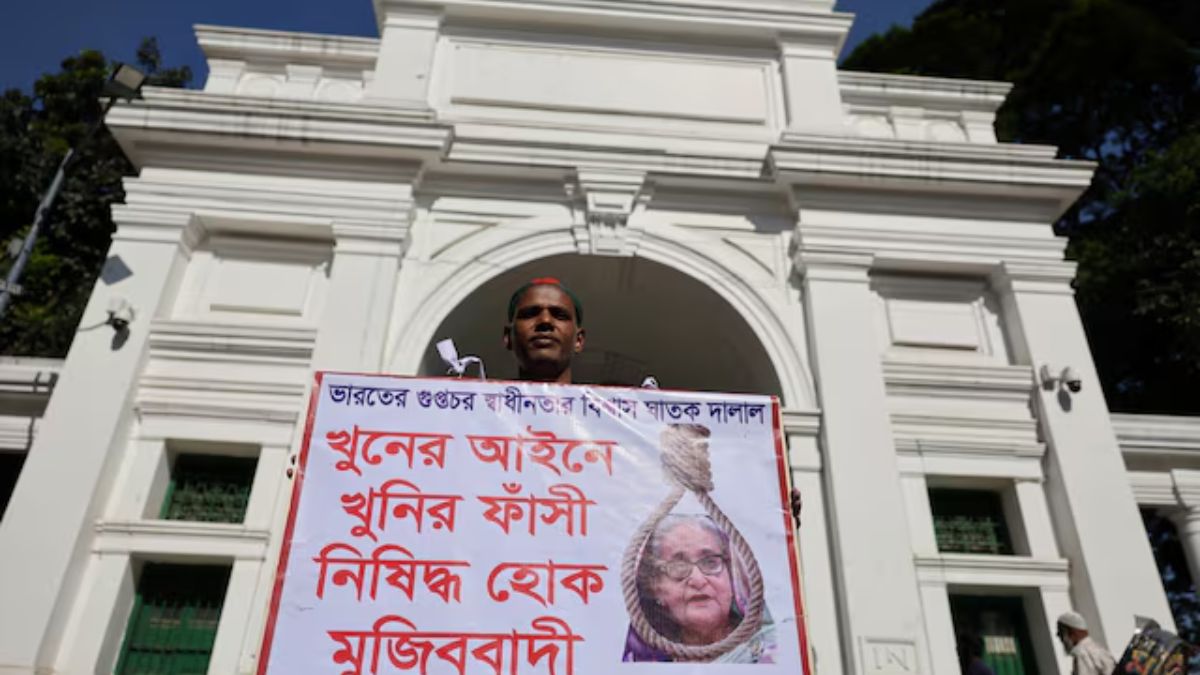Once a political heavyweight in Bangladesh for decades , Sheikh Hasina has now been sentenced to death for crimes against humanity.
Dhaka , the capital, was placed under heightened security following the verdict delivered by the International Crimes Tribunal after a months-long trial .
The court reportedly burst into cheers and applause after the death sentence was pronounced.
Hasina was found guilty of war crimes and of ordering lethal force by the Dhaka tribunal, 15 months after she resigned and fled to India in the face of a student-led uprising that left at least 1,400 people dead.
Her long reign as prime minister was marked by a crackdown on free speech, arrests of opposition leaders, and repression of dissent.
‘Biased, politically motivated’
Hasina , who is in India, has rejected the allegations, calling the verdict “biased and politically motivated.”
“I am not afraid to face my accusers in a proper tribunal where evidence can be weighed and tested fairly,” Hasina said in a statement after the verdict.
Her state-appointed defence counsel told the court that the charges were baseless.
Despite criticism of her years in power, Hasina, 78, was credited with turning around the economy and the massive garments industry of the Muslim-majority nation of 170 million, while also winning international praise for sheltering Rohingya Muslims fleeing persecution in neighbouring Myanmar.
But her downfall — she was ousted less than seven months after winning a fifth term — came after protests that began over job quotas swelled into a nationwide movement demanding her removal.
Quick Reads
View AllA UN report in February said up to 1,400 people may have been killed during the protests, most from gunfire by security forces. It cited evidence that it was official policy to attack and violently repress anti-government protesters and sympathisers.
The verdict by the International Crimes Tribunal — ironically, a court Hasina herself established to try war crimes from Bangladesh’s 1971 liberation war — marks a dramatic turn for a political career that began when she narrowly survived the 1975 coup that killed her father, Sheikh Mujibur Rahman, the founder of Bangladesh.
Hasina’s rise to power
Born in 1947 in what was then East Pakistan, Hasina was the eldest of five children.
After earning a degree in Bengali literature from Dhaka University in 1973, she gained political experience as a liaison between her father and his student followers.
Exiled to India after the 1975 coup, she returned in 1981 and was elected head of the Awami League — Bangladesh’s oldest political party and a key force in the independence struggle.
Hasina joined political rival Khaleda Zia, leader of the Bangladesh Nationalist Party, to spearhead the pro-democracy uprising that toppled military ruler Hossain Mohammad Ershad in 1990.
But the alliance was short-lived. Their bitter rivalry — often called the battle of the “battling begums” — went on to define Bangladeshi politics for decades.
Hasina first led the Awami League to victory in 1996, serving a five-year term. She returned to power in 2009 and did not lose power again until her ouster.
From dominance to downfall
Over time, critics said Hasina became increasingly autocratic. Her rule was marked by mass arrests of political opponents and activists, forced disappearances, and extrajudicial killings.
Rights groups warned that Bangladesh was slipping into a de facto one-party state under the Awami League. Hasina defended her tenure as a period of stability and development, arguing that strong, uninterrupted leadership was necessary to keep Bangladesh on track.
Khaleda Zia, herself a former prime minister, was jailed in 2018 on graft charges that her party said were politically motivated. She was freed after Hasina’s ouster.
The once-booming economy slowed sharply after Russia’s 2022 invasion of Ukraine pushed up global prices of fuel and food. Bangladesh turned to the International Monetary Fund last year for a $4.7 billion bailout.
Hasina fled the uprising in August last year with her sister on a military helicopter. Jubilant crowds later stormed the presidential residence, carrying out looted furniture and televisions.
Since then, Bangladesh has been governed by an interim administration headed by Nobel Peace Prize laureate Muhammad Yunus — a long-time critic of Hasina, who was convicted of graft under her government.
The Awami League has been barred from contesting parliamentary elections scheduled for early February.
_
With inputs from agencies_
)